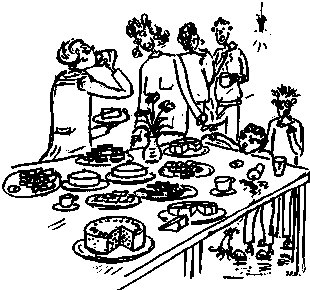 It is a part of ringing folk lore. Whether teas provided by ringers really are more splendid than those provided by other people is questionable, but in ringers' minds they are.
It is a part of ringing folk lore. Whether teas provided by ringers really are more splendid than those provided by other people is questionable, but in ringers' minds they are.The Tower Handbook
Ringers from all towers in the district (or farther afield) come together at one tower and ring with each other. The branch ringing master runs the ringing, and gives less experienced ringers a chance to ring with experts as well as letting the experts ring advanced things. You should all learn something and progress.
There may be afternoon and evening ringing separated by tea, often a service and perhaps a business meeting. Otherwise there may be just evening ringing. Times vary, so check the details. If you care to join them, some ringers often adjourns to the local hostelry afterwards. Training courses, seminars etc are often longer, a day or a weekend, but some may be half day or evening events.
Every member could not attend every meeting, but meetings only work if enough people do attend. You will probably make the effort when you are going for your own benefit, but there has to be some give as well as take. Could at least one or two of you attend every meeting? You will be pulling your weight, keeping your band in touch and getting to know ringers in other towers.
You can expect to be asked to have a meeting at your tower at some time or other. Most associations have some form of rota and try to visit all towers in their area. How often depends on how many towers there are. You will be asked well ahead and will need to seek permission from the church authorities and get it in the church diary. It can be embarrassing to turn up for a ringing meeting and find a concert about to start in church!
 It is a part of ringing folk lore. Whether teas provided by ringers really are more splendid than those provided by other people is questionable, but in ringers' minds they are.
It is a part of ringing folk lore. Whether teas provided by ringers really are more splendid than those provided by other people is questionable, but in ringers' minds they are.
Most of us have memories from our formative years of one or more splendid teas: piles of home made cakes, inexhaustible supplies of tea, cosy village halls or trestle tables on the rectory lawn. It isn't always like this, but those are the ones we remember.
Not necessarily, it depends whether the meeting spans afternoon and evening. If you are asked, see whether you have a suitable location and the resources to do so. Do not worry about trying to live up to the idealised reputations (see above). Your band's hospitality will suffice.
The church or village hall is the usual place but the church itself, schools, farmhouses, barns and (in summer) gardens have also been used. You need the means to boil water for cups of tea, and in winter good heat and light.
The traditional recipe is sandwiches with a variety of fillings, lots of fattening cakes and gallons of piping hot tea. You will not go wrong with this, but if you think something else more appropriate, then do it. Hot roast potatoes in winter, or a salad in summer can be all the more enjoyable because it is not what everyone has come to expect. Try to get the balance right between savoury and sweet food. See 'The Bellringer's Bedside Companion' for more information.
Currently hosted on jaharrison.me.uk